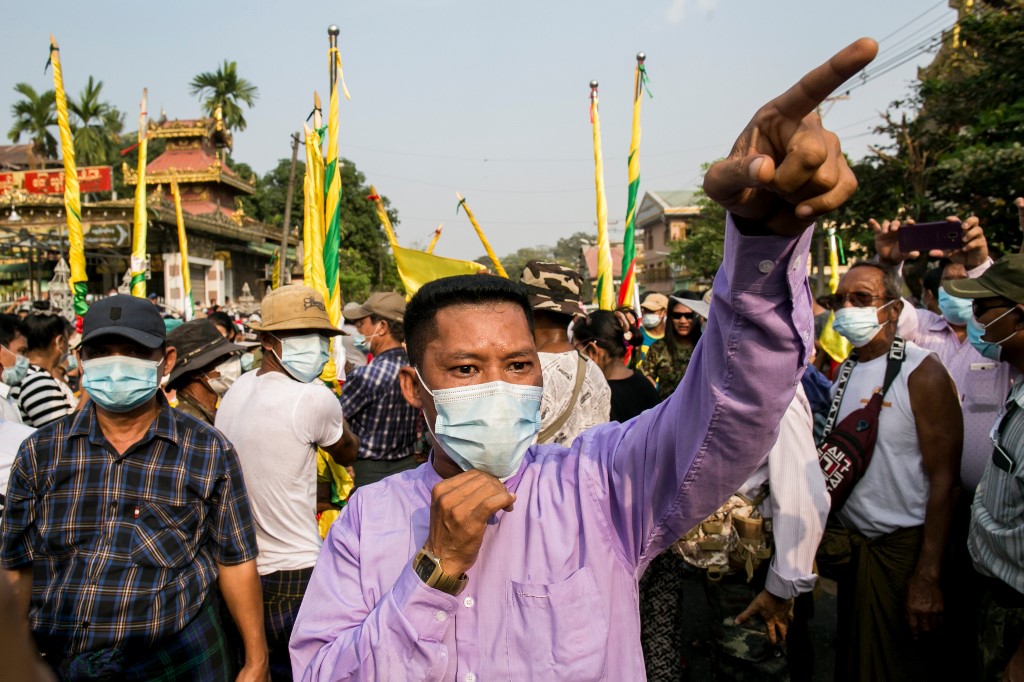
After a week of cryptic threats, armoured vehicles in urban areas and police positioned around quarantining lawmakers ahead of the start of a new parliament term, the possibility of a military coup jumped from highly unlikely to ‘stock up on supermarket supplies.’
Now Myanmar’s military has announced that it was all a big misunderstanding, and that of course it will abide by the constitution it drafted in 2008.
The Tatmadaw True News Information Team posted on Facebook today a statement saying General Min Aung Hlaing’s remarks about scrapping the constitution were misinterpreted. The military chief on Thursday told officers at the National Defence College that if the constitution is not followed “we must abolish it.”
Based on the speech, “some organisations and the media have been arguing that the military will repeal the 2008 constitution. But the statement by the commander-in-chief was just training for senior officers to understand the nature of the constitution,” according to the statement.
The Tatmadaw would “protect the constitution and act in accordance with the law,” according to the statement, which added that the charter was designed “for a multi-party democracy and ratified by a referendum after seven years of discussions involving academics and ethnic representatives.”
Calls to amend the constitution are perhaps strongest in ethnic states such as Rakhine, Shan and Kachin, where the Tatmadaw stands accused of multiple atrocities amid ongoing conflict.
The charter gives the military an automatic 25 percent of seats in parliament and control of key ministries – the referendum on the constitution was also widely criticized. Held in the direct aftermath of the Cyclone Nargis disaster, the voting was marred by claims of fraud.
How did we get here?
It was also accusations of voting fraud that led Myanmar to the current political crisis. The Union Solidarity and Development Party (USDP), the military’s electoral proxy, was crushed in the November 2020 general elections, securing only 33 out of the 642 available seats in the national legislature, the Pyidaungsu Hluttaw.
The party’s defeat was made even worse by the loss to the NLD of its former strongholds, including Meiktila and Pyawbwe, in Mandalay Region, where it no longer has a seat.
The USDP immediately claimed the election was fraudulent, citing voter list irregularities. At first, the Tatmadaw distanced itself from these conspiracies, but has since jumped in headfirst and is unhappy with the Union Election Commission’s response to its complaints.
International and domestic observers said they found no widespread fraud in the election, which the NLD dominated with a win of 83 percent of available seats.
The USDP has held numerous rallies denouncing the election commission, and, along with another military proxy, the Democratic Party of National Politics, has petitioned the Supreme Court to issue a writ forcing the commission to investigate the results, though the result is still unclear.
Meanwhile, incoming lawmakers travelled to Naypyidaw before attending the new parliament, which had been due to convene on Monday. The Amoyotha Htuttaw, the upper house, will now convene a day later than planned, state media reported.
Police reportedly arrived at the municipal guesthouse where the MPs were quarantined, raising concerns of their possible detention, as a military spokesman refused to rule out a coup on Tuesday.
Soon after, reports emerged of armoured military vehicles driving through downtown areas in Yangon, Kachin State’s Bhamo, and Sagaing’s Kantbalu.
After Min Aung Hlaing's remarks, foreign missions and the United Nations voiced their alarm, while Myanmar's highest Buddhist authority, the State Sangha Maha Nayaka called for negotiations to prevail "instead of heated arguments".
It appears, for now, that negotiations have prevailed.

